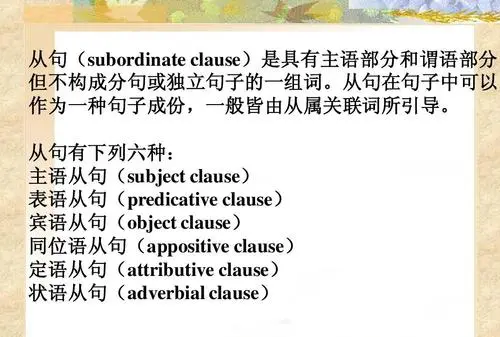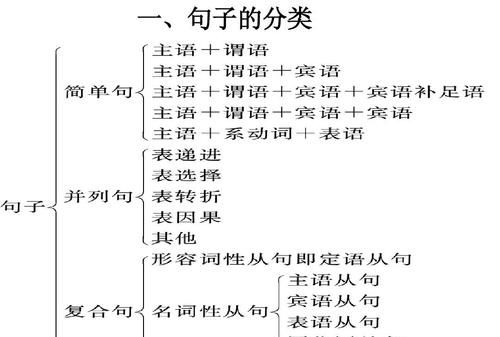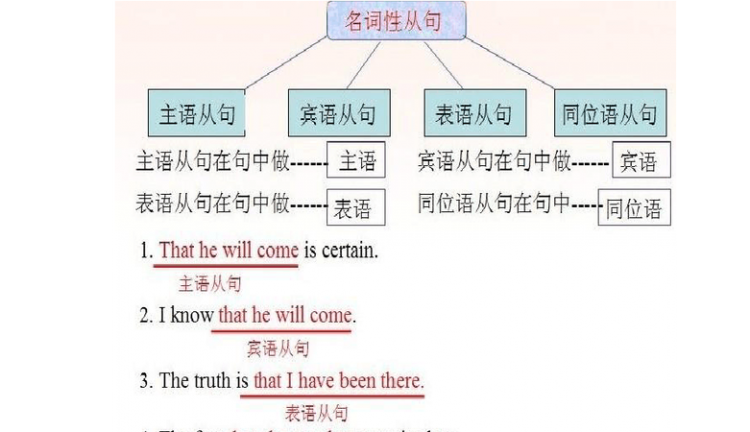本文目录
英语八大从句类型与用法总结图
根据从句语法功能的不同可分为:主语从句、表语从句、宾语从句、同位语从句、定语从句和状语从句6类。
1、主语从句
主语从句就是作主语的从句。它的连接词有连词、连接副词、连词代词。主语从句放在句首时,句子显得很笨重,因此常用it作形式主语,而将真正的主语后置,比如:
It is a pity that you have missed such a wonderful concert.
真遗憾你错过了这么精彩的一场音乐会。
2、表语从句
表语从句就是作表语的从句。它的连接词有连词、连接副词、连词代词等。
比如:
My idea is that we meet at the bus stop.
我的想法是我们在公共汽车站会面。
3、宾语从句
宾语从句就是作宾语的从句。它的连接词有连词、连接副词、连词代词等。
比如:
She said that she would drop maths.
她说她要放弃数学。

4、同位语从句
同位语从句就是作同位语的从句,它的连接词有连词、连接副词等。
The fact that everyone loves beauty is common sense.
人人爱美是常识。
5、定语从句
定语从句就是作定语的从句。定语从句主要修饰、限定、描绘名词,有时修饰代词,放所修饰词后边。
比如:
The girl who wears a new dress is my daughter.
那个穿新衣服的女孩是我的女儿。
6、状语从句
状语从句就是作状语的从句。在复合句中修饰主句中的谓语动词、形容词或副词,起状语作用的从句叫作状语从句。
比如:
Soon after he jumps his parachute will open.
他跳伞之后,降落伞就会打开。
英语的几种从句,举例说明
有三大类
1.名词性从句 2.定语从句 3.状语从句
名词性从句中分:
1.主语从句:例,it is important to read book.(形主it作主语,真正的主语是to read book)
that air has pressure was known long ago.(关联词that引导的句子that air has pressure作主语从句)
2.宾语从句:I think it necessary that he should do his homework.(形式宾语it引导的)
I'm sure that my test will succeed.(sure后用that引导的宾从)
3.表语从句:系动词后的从句
it may be as you say(be是系动词,后面用as引导的)
this is that he is too young to go to school.(有系动词is,后面由that引导的表语从句)
4.同位语从句:同位语从句是对前面名词的解释说明,如:
The facts that he had done his homework.(事实就是he had done his homework,是对前面the facts的解释,是什么事实)
定语从句:在句子中起定语作用,修饰剧中的名词或代词的从句叫定从
例:the man (who is shaking hands with my father) is my teacher.(括号中就是定从,修饰限定the man)
BeiJin is a city (which has a long history).(括号中是定从,修饰the city)
状语从句:在复合句中担任状语成分的从句叫状语从句
例:I will tell her about that (when i see her).为时间状从
just stay (where you are).为地点状语
Because he is ill,he is absent today.为原因状语
这也很局限,其实要讲的还很多,你可以多看看语法书之类的

英语从句的类型与用法
从句有主语从句、表语从句、宾语从句、同位语从句、定语从句和状语从句6类.前四类由于主语从句、表语从句、宾语从句及同位语从句在句子的功用相当于名词,所以通称名词性从句;后两类定语从句和状语从句功用相当于形容词,称为形容词性从句.状语从句还可以分为条件状语从句、原因状语从句、方位状语从句和时间状语从句.
1.主语从句(Subject Clause):用作主语的从句叫主语从句.引导主语从句的关联词有从属连词、疑问代词、疑问副词、缩合连接代词、缩合连接副词等.
2.表语从句(Predicative Clause):用作表语的从句叫表语从句.引导表语从句的关联词与引导主语从句的关联词大都一样.
3.宾语从句(Object Clause):在句子中起宾语作用的从句叫做宾语从句.宾语从句分为三类:动词的宾语从句,介词的宾语从句和形容词的宾语从句.
[
第一部分
一.、定义:
宾语从句就是一个句子作动词或介词的宾语.
二、学习宾语从句要抓住三要素:连接词、语序和时态.
连接词一般都是that(指事务或人),which(指事),who(指人)
1.从句为陈述句,常选择连接词that或将that省略,直接与主句相连.
2.从句为一般疑问句,常选择连接词if或whether.在whether…or not结构中不能用if替换.
3.从句为特殊疑问句,常选择what,when,where,which,who,how等的疑问代、副词作连接词.
★当who为主语时,句式为:who+谓语+其他
判断时态情况:
1.主句是一般现在时,从句为各种时态情况
2.主句是一般过去时,从句为各种相应过去时态注意:从句描绘客观事实,用一般现在时
3.主句是一般将来时,一般从句为一般现在时(“主将从现”)
例题:
〈1. The teacher told the children that the sun__B__ round.
A. was B. is C. were D. are 答案为B,属于第二种情况.
宾语从句,在复合句中作宾语,位于及物动词后;
Tell him which class you are in .
(1)主、从句时态一致:
主句谓语过去时,从句相应过去时;
He answered that he was listening to me.
主句谓语现在时,从句时态任所需;
He says (that) he will leave a message on my desk.
具体过去永不变,真理格言现在时;
He told me that he was born in 1980.
(2)否定前移,及完成反意问句;
在think / believe / suppose / guess / imagine / expect等动词后跟宾语从句否定式时,应转移到主句上去,完成反意疑问句时,应与从句主、谓保持一致.(注: 否定前移的条件是,主句主语是第一人称)
I don't think you are right ,are you ?
(3)在表示建议 suggest , advise
要求demand 、desire、require、request、propose;
决定 decide; 命令 order、command; 坚决主张 insist;
等动词后跟宾语从句,用(should)+v.(虚拟语气)
eg. I suggested that you(should)study hard.
(4)如果宾语从句后有宾语补足语,用it作形式宾语,把宾语从句后置
eg.You may think it strange that he would live there.
(5)宾语从句that常可省略,但在以下情况下不能省略
A.当主句谓语动词带有两个或两个以上宾语从句时,可以省略第一个that,其他不能省略.
eg.I believe(that)you have done your best and that things will get bet?鄄ter.
B.当it作形式宾语时
eg.She made it clear that she had nothing to do with him.
C.当宾语从句前置时
eg.That our team will win,I believe.
三、分类
A 、作动词的宾语:
eg.I heard the news
I 主语 heard 谓语动词 the news.名词作宾语
I主语 heard 谓语动词 that he would come here later on.一个句子作宾语---宾语从句
B 、作介词的宾语:
eg.He said nothing about this plan .
He主语 said 谓语动词 nothing 代词作动词的宾语 about 介词 the plan. 名词作介词的宾语
四、带有宾语从句的复合句的构成:
带有宾语从句的复合句就是用连接词把一个主句和一个宾语从句连接在一起.连接词有:that(可省略),what, who, when, where, why, which, if, whether, how.
五、注意:
A 宾语从句必须用陈述语序.
False: He is wondering when can he finish this difficult job.
Right: He is wondering when he can finish this difficult job.
B 有时候可以用it 作形式宾语,而把真正的宾语从句放在后面.
Bad: I thought that he could finish this job in just two hours impossible.
Good: I thought it impossible that he could finish this job in just two hours.
Bad: He left whether we should continue this project to my judgment.
Good: He left it to my judgment whether we should continue this project.
C 带有宾语从句的复合句的否定形式一般是否定主句.
Bad: I think he doesn’t like the English teacher.
Good: I don’t think he likes the English teacher.
D False: He wanted to know why he is crying in the corner.
Right: He wanted to know why he was crying in the corner.
4.同位语从句(Appositive Clause): 与先行词同位或等同的从句叫作同位语从句.其关联词多为that.
5.定语从句(Attributive Clause):用作定语的从句叫定语从句.定语从句一般皆放在被它所修饰的名(代)词之后,这种名(代)词就叫作先行词(Antecedent).引导定语从句的关联词为关系代词(或称引导词、关系词等).关系代词在定语从句中可用作主语、宾语、定语等;关系副词在定语从句中用作状语.
①引导定语从句的关联词有who, whom, whose, that, when, where, why 和 which. 在非限制定语从句中, 只可用which, who, whose, where , when., 如果指代前面整个句子, 多用which.
例句:
The dog that/which was lost has been found. (失踪的狗已经找到了.)
③as 可做引导词引导定语从句, 多和such, the same 连用. As 引导的定语从句也可修饰整个句子, 既可放在先行词后,也可放在句子开头.
例句:
Such people as you describe are rare nowadays.(你描述的那一类人现在很少了.)
④介词+which/whom/whose从句
The driver is the man from whose room she had stolen the gold watch.(她就是从那个司机的房间偷了金表的.)
⑤代/名+介词+which 从句
He is needing a book, the name of which I don't know.(他需要一本书,但是我不知道书名.)
⑥同位语从句和定语从句
The news that you told me was really exciting.(你告诉我的好个消息真的是很激动人心.)
⑦ 难句:
NO.1He is one of the men who were chosen to represent the group.(他是被选为代表该团队的人中一员.)
第二部分
一、时态
1·主句用一般现在时,从句可用任意时态.
2·主句用过去时,从句用过去某个时态.
3·主句用过去时,从句是真理时,只用一般现在时.
二、宾语从句的几类连接词:
①从属连词
连接宾语从句的从属连词主要有that,if,whether. that引导表示陈述句的宾语从句,而if和whether引导表示“是否”的宾语从句.
例句:
I don’t know if there will be a bus any more.
我不知道是否还会有公交车.
②连接代词
连接代词主要有who, whom ,whose ,what ,whoever ,whomever ,whosever, whatever, whichever等.
连接代词一般指疑问,但what, whatever除了指疑问外,也可以指陈述.
例句:
Do you know who has won Red Alert game?
你知道谁赢了这一局红警游戏吗?
③连接副词
连接副词主要有when,where,why,how,whenever,wherever,however等.
例句:
He didn’t tell me when we should meet again.
他没有告诉我什么时候我们能再见面.
三、动词的宾语从句
大多数动词都可以带宾语从句
We all expect that they will win , for members of their team are stronger.
我们都预料他们会赢,因为他们的队员更强壮.
★部分“动词+副词”结构也可以带宾语从句
例句:
I have found out that all the tickets for the concert have been sold out.
我发现这场音乐会的所有票都卖光了.
★动词短语也可以带宾语从句
常见的这些词有:make sure确保 make up one’s mind下决心 keep in mind牢记
例句:
Make sure that there are no mistakes in your papers before you turn them in.
在上交试卷前确保没有任何错误.
四、可运用形式宾语it代替的宾语从句
①动词find,feel,consider,make,believe等后面有宾语补足语的时候,则需要用it做形式宾语而将that宾语从句后置.
例句:
I think it necessary that we take plenty of hot water every day .
我认为每天多喝开水是有必要的.
②有些动词带宾语从句时寻要在宾语与从句前加it
这类动词主要有:hate, take , owe, have, see to.
例句:
I hate it when they with their mouths full of food.
我讨厌他们满嘴食物时说话.
③若宾语从句是wh-类,则不可用it代替
例句:
We all consider what you said to be unbelievable.
我们都认为你所说的是不可信的.
五、介词的宾语从句
用wh-类的介词宾语从句
例句:
We are talking about whether we admit students into our club.
我们正在讨论是否让学生加入我们的俱乐部.
★用that,if引导的介词宾语从句有时候except,but,besides三个介词后可见到that引导的宾语从句
例句:
I know nothing about my new neighbor except that he used to work with a company.
对于我的新邻居我只知道他曾在一家公司上班,其他一无所知.
六、形容词的宾语从句
常用来引导宾语从句的形容词有: sure,certain,glad,please,happy,sorry,afraid,satisfied,surprised
例句:
I am sure I will pass the exam.
我确信我会通过考试.
七、if,whether在宾语从句中的区别
①if和whether在作“是否”解时,引导宾语从句常放在动词know,ask,care,wonder,find out等之后,介词后一般不用if
②少数动词,如:leave,put,discuss,doubt后的宾语从句常用whether.
③whether后可以加or not,但是if不可以.
④在不定式前只能用whether.
如: I can’t decide whether to stay. 我不能决定是否留下.
⑤避免歧异时,我们常用whether而不用if.
八、哪些宾语从句不可以省略引导词that
1.当that作learn,suggest,explain,agree,wonder,prove,mean,state,feel,hold等动词的宾语时;
2.当宾语从句较长时;
3.当主语状语置于主句尾,宾语从句之前时;
4.当主语谓语动词(包括非谓语动词)与宾语从句之间有插入语时;
5.当一个动词带有两个或两个以上宾语从句时,此时第一个that可以省略,第二个that不可以省略;
6.当宾语从句中的主语是this,that或this,that做主语的定语时;
7.当宾语从句是双宾语中的直接宾语时;
8.当宾语从句的主语是非谓语动词或主语从句时;
9.当主语中的谓语动词是固定词组时;
10.当宾语从句有it做其先行词时;
11.在直接引语中,转述分句把宾语从句隔开时.
九、宾语从句的否定转移
主句的谓语动词是think,believe,imagine,suppose,consider,espect,fancy,guess等,并且主句的主语是第一人称而且为一般现在时,从句的否定词一般要转移到主句上来,其反义疑问句一般与宾语从句一致.
例句:
I don’t think he will come to my party.而不能说成I think he won’t come to my party.
我认为他不会来我的舞会.
★如果宾语从句中有某个含有否定意义的形容词或副词,其反义疑问句要用肯定形式.
例句:
We find that he never listens to the teacher carefully,does he?
我们发现他从来不仔细听老师讲课,是不是?
十、宾语从句的时态和语序
当主句为现在时或将来时的时候,宾语从句的时态一般不受主句的时态所影响.
当主句为过去时的时,细分为一下几种情况:
①从句用一般过去时或过去进行时表示与主句谓语动词动作同时发生
例句:
I only knew he was studying in a western country,but I didn’t know what country he was in.
我只知道他当时在西方的一个国家读书,可不知道是哪个国家.
②从句过去完成时表示该动作发生在主句谓语动作之前
例句:
He told me that he had told Mary about the meeting already.
他告诉我他已经把有关会议的事情告诉的了Mary.
③从句谓语用过去将来时表示该动作发生在主句谓语动作之后
例句:
The reporter asked if the government would take necessary measures to put down the to-do.
记者问政府是否会采取必要的措施镇压骚乱.
★如果从句是一个客观真理,那么从句的时候不根据主句的时态而变化
例句:
The teacher said that the moon goes around the earth yesterday.
老师昨天说月亮绕着地球转.
★当宾语从句的引导词是who,which,what,when,where,how,why等表疑问时,不能按正常语序安排,经常将这类引导词置于句首
例句:
Who do you think the public might choose as their favorite singer this year?
你认为今年公众会选谁为他们最喜欢的歌手.
同位语从句用法比较"固定",把关键的几个词背下来(下面这个材料供参考):
一、在复合句中用作同位语的从句叫同位语从句.它一般跟在某些名词后面,用以说明该名词表示的具体内容.如:
I had no idea that you were here.我不知道你在这里.
二、可以跟同位语从句的名词通常有news,idea,fact,promise,question,doubt,thought,hope,message,suggestion,words(消息),possibility等.如:
I’ve come from Mr wang with a message that he won’t be able to see you this afternoon. 我从王先生那里来,他让我告诉你他今天下午不能来看你了.
三、英语中引导同位语从句的词通有连词 that,whether,连接副词 how,when,where等.(注:if,which 不能引导同位语从句.)如:
l have no idea When he will be back.我不知道他什么时候回来.
四、有时同位语从句可以不紧跟在说明的名词后面,而被别的词隔开. 如:
The thought came to him that maybe the enemy had fled the city.
他突然想起可能敌人已经逃出城了.
五、同位语从句与定语从句的区别.
1、同位语从句与前面的名词是同位关系,即说明它前面名词的内容;而定语从句与前面的名词是修饰与被修饰关系,即限定它前面的名词范围,或补充一些情况.如:
The news that l have passed the exam is true.我通过了考试这一消息是真的.
(同位语从句,即从句所表达的意思就是前面名词的内容.)
The news that he told me just now is true.他刚才告诉我的消息是真的.
(定语从句,从句对前面名词起修饰限制作用,即“他告诉我的”那个消息,而不是别的消息.)
2、引导同位语从句的that是连词,在从句中不充当任何成份,而引导定语从句的that是关系代词,除起连接作用外,还在从句中充当主语、宾语或表语等.如:
The idea that computers can recognize human voices surprises many people.
计算机能够识别人的声音的想法使许多人感到惊奇.(that在从句中不充当任何成份.)
一个名词(或其它形式)对另一个名词或代词进行修饰,限定或说明,这个名词(或其它形式)就是同位语.同位语与被它限定的词的格要一致,并常常紧挨在一起.
1) 非独立的同位语:常出现在被限定词前
Bruce Lee (姓名) 李小龙
Graf Schmidt (称号,浑名) 施密特伯爵
Doktor Wang (职称,头衔) 王博士
Uncel Liu (亲戚的称呼) 刘叔叔
die Stadt Shanghai (类属名称) 上海市
the Province Hebei (类属名称) 河北省
das Jahr 2000 (类属名称) 2000 年
three Kilo tomato (度量名称) 三公斤西红柿
the University Bremen (专有名词) 不来梅大学

英语中几大从句及其句型
按一般说法,可分为三大类14种从句。
一名词性从句4种。
1主语从句Whether it's right or not remains to be seen.
2宾语从句I wonder whether it's right or not.
3同位语从句This is a question whether it's right or not.
4表语从句The question is whether it's right or not.
二形容词性从句2种
1限定性定语从句She is the student who can speak English well.
2非限定性定语从句She is the student,who can speak English well.
三副词性从句8种
1时间状语从句The fact will e out when he es here.
2地点状语从句You can go wherever you like.
3原因状语从句Pay more attention to your lessons because you are a student.
4方式状语从句He walks as if he were a king.
5目的状语从句She went to Japan so that she could learn Japanese well.
6结果状语从句She went to Japan so that she learned Japanese well.
7条件状语从句I will understand it if he tells me.
8让步状语从句He knows a lot though he is little.
求有定语从句的英语作文。
100字啦。
您好!下面这篇写得不错: An ingteresting tripI have been to many interesting places in Yiwu,but I have not been to many other parts of China yet.Last month I went to the West Lake where is a famous scenic spot in Hangzhou with my family by bus.The scenery around the lake was very beautiful.There were many tall trees and beautiful flowers.Some people were walking around the lake and some people were boating on the lake. We played near the lake and enjoyed the beautiful scenery.Each of us lost ourselves in the beautiful scenery.Suddenly it rained.We ran in the rain and we were all wet.But we were very happy.After a while the rain stopped.The sky became very colourful. “How beautiful it is!”I said to myself.In the afternoon we went back home by train .My trip seemed very short,but my memory of the pleasant trip will last long.
求一篇定语从句英语作文
My grandpa is an old man who was born in 1924 and has ever attended the paign of Defending the Burma Road,which is a movement happened when he was about 20 years old.Later he joined the army in response to the call of our country,which had great influences on his life and personality.He learned to be strong-minded and insistent.Also,it is the thing that he usually taught me later.He told me to learn to be a person who is unyielding and brave to face difficulties that others don't dare to.【公益慈善翻译团】真诚为您解答!
求一篇定语从句英语作文
My grandpa is an old man who was born in 1924 and has ever attended the paign of Defending the Burma Road,which is a movement happened when he was about 20 years old.Later he joined the army in response to the call of our country,which had great influences on his life and personality.He learned to be strong-minded and insistent.Also,it is the thing that he usually taught me later.He told me to learn to be a person who is unyielding and brave to face difficulties that others don't dare to.【公益慈善翻译团】真诚为您解答!...
求一篇定语从句的英语作文。
80词左右,九年级的水平,词不要太难,...
My favorite movie is "kung fu panda,". This movie is about the beautiful scenery in the pinggu and, there lived a group of wulin. But the difference is, and the wulin, pinggu are all animals. The panda the treasure is probably one of the valley will not the fighting skill of residents. And fat and slow the treasure in the father of work in business noodle, father hope the treasure can inherit, however the treasure is a noodle who is learning in the valley, and bee the first fighting skill of kung fu masters. But it has always been lazy to bo, it was just a distant dream only. The tortoise master recently had the foreboding: the great dragon snow leopard, is about to break through the trap it DuoNian of imprisonment, dragon after prison will surely e and pinggu revenge. So, and will immediately pinggu meeting
用定语从句写一篇英语作文 my free time
As a middle school student,I don't have much free time,but I still have a lot of things to do.I like listening to music and reading,so in my free time,I always listening to music and search the Inter for about half-hour.It's a good way to relax myself.I always do some reading before go to bed.Besides,I always go to swimming after school.Exercises help me to keep healthy and do good to my study.As the same as other students,I often watch TV in the evening,but I have to finish my homework first
用3到4句宾语从句写英语作文《Sports》,3句话一定都要宾语从句
In my life, sports play an important role. I am really fascinated in swimming. I first learnt to swim when I was 7 years old. I fell in love with thesport on the very first day. It bees a part of my life now.Every weekend, I go to the stadium near my home. I swim ice aweek. I was quite weak before I started to swim. Swimming makes mehealthy and now I go to hospital much less than before. I gotplenty of benefits from swimming. In fact, learning isn't an easything. But no pains, no gains. The hard work I had paid was worthbecause I gained a lot. In my opinion, sports are really important.They enable me to live healthily and happily.
定语从句英语作文,80字
My Family I have a family which is not big, but warm. In my family there are three people who are my father, my mother and I. My father is a young man who works very hard in a hospital. He likes playing football, which is his hobby. He also likes to read novels which were written by famous writers. My mother is a young woman who works in the same middle school as I study in. She teaches maths in ourr school which is the best school in our city. She likes watchingTV plays which are acted by famous stars, such as Chen Daoming, Liu Xiaoqing and so on. I am a boy who studies a middle school. I am very clever. I like playing basketball which is my hobby. And I like watching NBA Games which are played by famous players. This is my family which is a warm and happy family.希望能帮到你,祝更上一层楼O(∩_∩)O有不明白的请继续追问,可以详谈嘛(*^__^*)...
求一篇英语作文 最好多用状语从句
写英语作文的时候,最好的方式是挑简单明了的句子写,用从句写的话一旦运用错误就会扣分,而用简单的句子就不会让老师跳出毛病,自然而然就会避免扣分. 这里简单跟楼主介绍一下状语从句,同位语,还有定句从句的区别,仅供参考:状语从句:一般作为先行条件,解释什么样的情况下发生什么样的事情,主要作为“条件”,一般放在句前,也有放在句子后面的,较少. 同位语:一般作为解释一个”词“,这个词通常为主语/宾语,也有定语,但是同位语的作用就是用来说明这个主语或者宾语处于什么状态,是什么样子等等. 定语从句:很显然,定语从句是用来做形容词的,它通常用来形容主语/宾语/或者一整个句子希望可以帮助楼主
高考英语作文怎么样写简单的从句??
高中从句有3大从句,分别为:状语从句,定语从句,名词性从句。
其中名词性从句又分为:同位语从句,表语从句,主语从句,宾语从句。
状语从句又分为:时间,地点,原因,结果状语从句。
比如, A girl who is named Jan .这就是一个简单的定语从句。
There is a house ,which is my home 这是个典型的非限制性定语从句再比如,I am crazy ,这是个简单的表语从句。
The girl is Chinese 这是宾语从句。
还有......上面这些都是很简单的句子,只要你一般写作文的时候不犯原则性错误,这些简单都可以试着用用。
I have a friend named YangYang. Her medium height, shapely, oval face, *** all eyes but great temperament. She is interested in singing and dancing. She has participated in the city's singing petition, won the first prize. She loves sports, like hiking fitness. She was a helpful person. Once she saw in the street an old lady fell on the road, she was sent to hospital after the old woman propped up their own money to grandma doctor, then quietly leave, even the name was left. Her favorite food is pasta, I always ask her to eat noodles.

以上就是关于英语各个从句,英语八大从句类型与用法总结图的全部内容,以及英语各个从句 的相关内容,希望能够帮到您。
